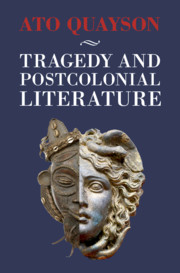Book contents
- Tragedy and Postcolonial Literature
- Tragedy and Postcolonial Literature
- Copyright page
- Dedication
- Contents
- Preface and Acknowledgments
- Chapter 1 Introduction
- Chapter 2 Ethical Cosmopolitanism and Shakespeare’s Othello
- Chapter 3 History and the Conscription to Colonial Modernity in Chinua Achebe’s Rural Novels
- Chapter 4 Ritual Dramaturgy and the Social Imaginary in Wole Soyinka’s Tragic Theatre
- Chapter 5 Archetypes, Self-Authorship, and Melancholia
- Chapter 6 Form, Freedom, and Ethical Choice in Toni Morrison’s Beloved
- Chapter 7 On Moral Residue and the Affliction of Second Thoughts
- Chapter 8 Enigmatic Variations, Language Games, and the Arrested Bildungsroman
- Chapter 9 Distressed Embodiment and the Burdens of Boredom
- Chapter 10 Conclusion
- Bibliography
- Index
Chapter 8 - Enigmatic Variations, Language Games, and the Arrested Bildungsroman
Arundhati Roy’s The God of Small Things*
Published online by Cambridge University Press: 05 February 2021
- Tragedy and Postcolonial Literature
- Tragedy and Postcolonial Literature
- Copyright page
- Dedication
- Contents
- Preface and Acknowledgments
- Chapter 1 Introduction
- Chapter 2 Ethical Cosmopolitanism and Shakespeare’s Othello
- Chapter 3 History and the Conscription to Colonial Modernity in Chinua Achebe’s Rural Novels
- Chapter 4 Ritual Dramaturgy and the Social Imaginary in Wole Soyinka’s Tragic Theatre
- Chapter 5 Archetypes, Self-Authorship, and Melancholia
- Chapter 6 Form, Freedom, and Ethical Choice in Toni Morrison’s Beloved
- Chapter 7 On Moral Residue and the Affliction of Second Thoughts
- Chapter 8 Enigmatic Variations, Language Games, and the Arrested Bildungsroman
- Chapter 9 Distressed Embodiment and the Burdens of Boredom
- Chapter 10 Conclusion
- Bibliography
- Index
Summary
In Chapter 8, Arundhati Roy’s God of Small Things dramatizes the tragedy of Ammu, Rahel, and Estha. The children experience profound guilt for their part in the deaths of their cousin Sophie Mol and of Velutha, the god of small things of the title. The deaths are focalized through their eyes and told across two time frames, which serves to give us progressive, if fragmentary, instalments of the collapse of the children’s own internal emotional landscapes. I argue that even though the distribution of the story across two time frames suggests the shape of a fractured bildungsroman, the traumatic events of their childhood so firmly seal them into the discourse of tragedy, that theirs becomes not the story of growing up but rather the teleology of an arrested development. I trace the various ways in which the crises in the social world are metonymically displaced onto that of volatile nature.
Keywords
- Type
- Chapter
- Information
- Tragedy and Postcolonial Literature , pp. 238 - 263Publisher: Cambridge University PressPrint publication year: 2021
- 1
- Cited by

